Fighting the clones: Bristol developer calls time on chain cafes
- Published
Wapping Wharf in Bristol is bucking the trend of High Street brands by going local
Why do new shopping centres and waterfront developments always feature the same national chains of cafes and shops?
A new development in Bristol has bucked the trend, favouring local shops and cafes instead.
And if you take a close look at it, you soon find out why the UK's property market keeps producing what some call "cloned High Streets".
At first sight, Wapping Wharf looks like another identikit development.
Shiny apartment balconies look over the shimmering harbourside. Beneath them, soy lattes and craft beer are available from dawn till dusk.
On the corner, a small supermarket offers convenience meals and takeaway sandwiches.
And like the rest of Bristol's post-industrial city centre docks, it has been decades since Wapping Wharf saw any serious cargo unload.
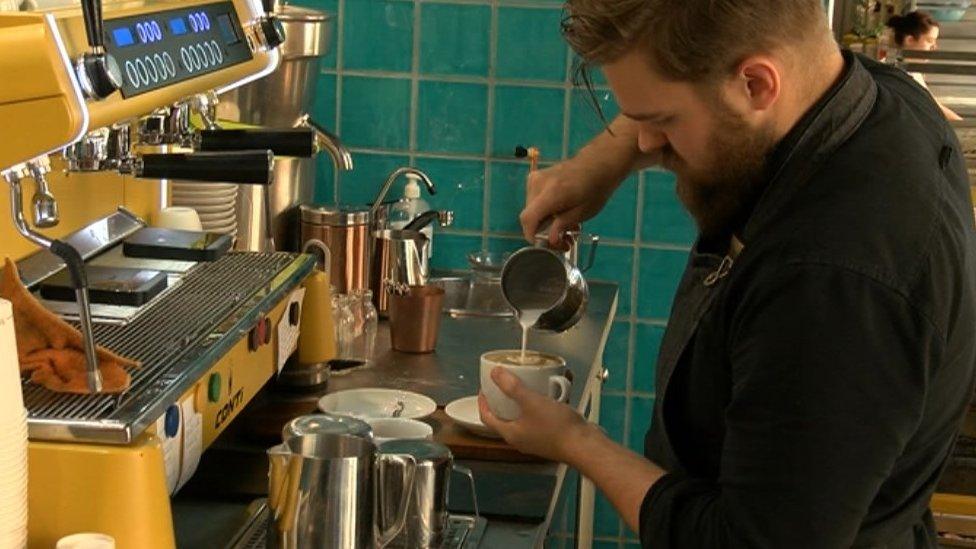
The coffee shop in Wapping Wharf is another local business
Two cranes standing on the quayside are now heritage sights for tourists, instead of a mainstay of the city's trade.
But on closer inspection, Wapping Wharf bucks the trend.
There is coffee, but no Starbucks, Costa or Caffe Nero. Instead, a Bath coffee firm called Mokoko has set up shop.
Beer comes not from a national chain, but a small Somerset craft brewer called Wild Beer. And the anchor tenant on the corner is not a multiple supermarket, but a Bristol outfit called Better Food.
The owner has decided to let every shop and cafe to local independent retailers. This is both rare and revealing.
'Unusual approach'
Stuart Hatton is not a campaigner, but a developer.
As he shows me around the new Bristol development, he is clearly proud of the quirky brewers and committed coffee makers.
But he can afford to back independents because his family property firm is set up differently.
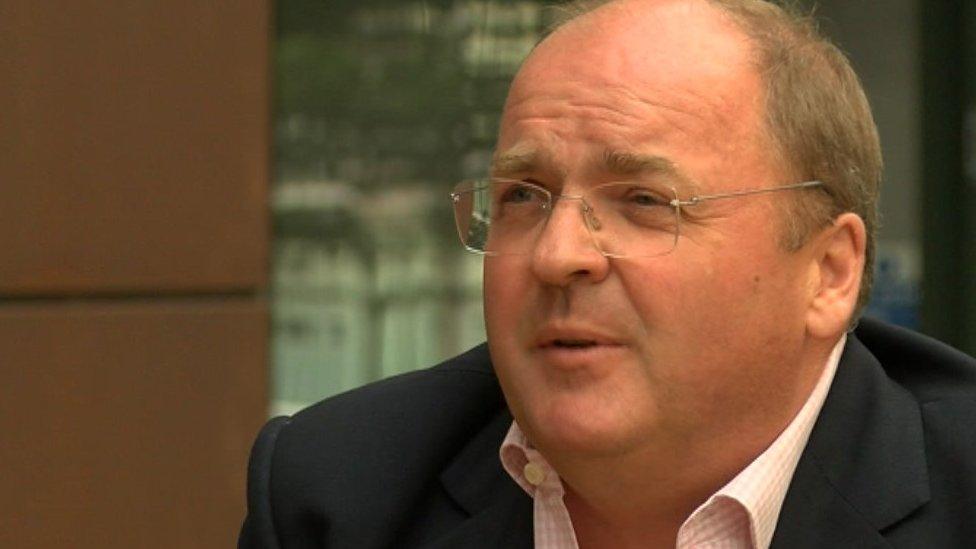
Stuart Hatton is bucking a nationwide trend
He explains how his industry normally works: "A traditional developer would build it, let it and then sell.
"And obviously they want to get the best sales price that they can."
Developers with shareholders and financial institutions behind them need to sell fast. And what they are selling is certainty: the assurance that tenants will pay the rent for 10 years or more.
The normal economics favour the multiples, Mr Hatton explains: "It is less risky for an investor to buy a shop with M&S in, for instance, than a shop with a small independent retailer."
You don't have to go far to see the normal system at work. Across the water, the first phase of Bristol's harbourside regeneration features Costa, Tesco Metro and Pizza Express.
Mr Hatton's firm makes its money from renting the shops, so he is not worried about the sale price, or what the property market calls the "covenant value" of a retail unit.
But his approach is unusual, according to Bristol retail agent Will Duckworth, from the property firm JLL.
"This is very rare," he tells me. "Most developers go the same way, to keep the investors happy.
"They want a quick return on their investment and it's easier to do that with a national brand that's got a good history of trading."
The new shopkeepers and brewers are happy, as you would expect.
But apart from offering a bit of a change to the normal High Street chains, some say independent retailers actually make a city richer.
Rachel Lawrence, an economist who studies how cities work for the New Economics Foundation, came to look at the new development and find out where the retailers are buying from.
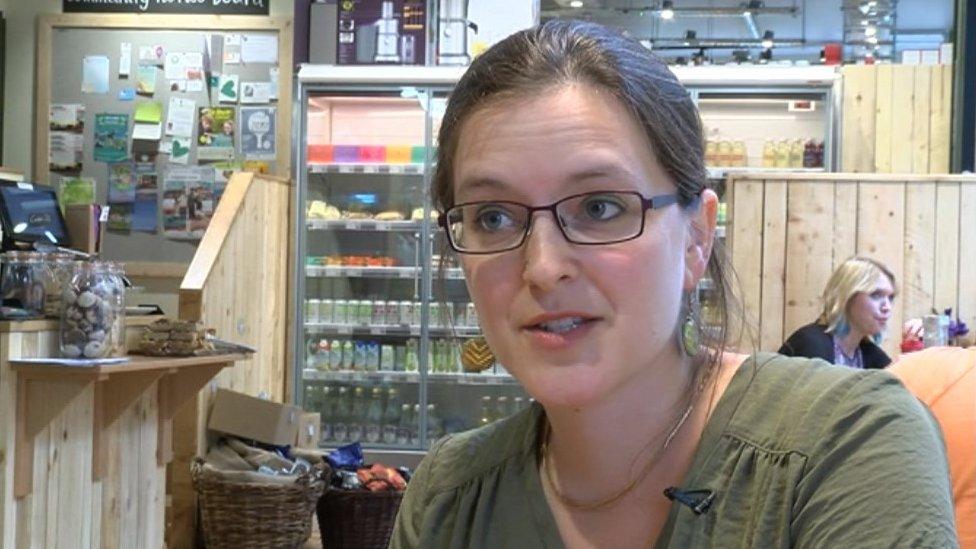
Rachel Lawrence says schemes designed to regenerate deprived areas often backfire
Her research has uncovered a persistent problem in regeneration schemes, designed to bring wealth to deprived areas.
"Often they end up importing new, wealthy residents, and then bringing in expensive shops owned by multinational companies for them to spend their money in.
"There is new economic activity, but very little of it is benefiting the local economy."
Enriching the local area
At Wapping Wharf, the Bristol-owned supermarket Better Food takes a different approach.
Mike Bailey shows Ms Lawrence around his organic food store, pointing out fresh produce from a community-owned farm just seven miles away in the Chew Valley.
Bread comes from a family bakery in the Cotswolds; pulses, rice, beans and flour from a worker-owned co-op just a mile up the road.
For Rachel Lawrence, this is what makes the difference.
"Locally owned stores like this are much more likely to buy from local supply chains," she explains.
"If the money is going into local suppliers, much more of the benefit of this development is enriching the local economy, and that is really the holy grail of regeneration schemes like this."
All this is lovely if the shops stay afloat. But Britain's retailers have rarely had to fight so hard for a living, competing with online stores, multiple discount chains and customers who spend more frugally.
Now, though, new research reveals that some independent stores are growing, and quite fast.
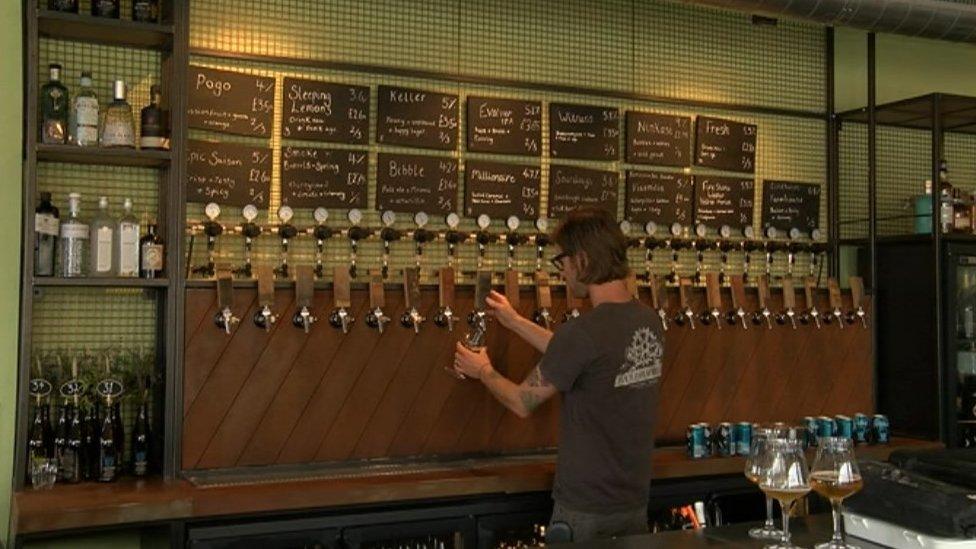
Wild Beer is flying the flag for local craft beer at Wapping Wharf
For Matthew Hopkinson, it comes down to a single simple question: "Can you get a coffee or a haircut on the internet?"
Mr Hopkinson runs the Local Data Company, analysing data as shops open and close. And there have been plenty of closures: not just the big names like BHS, but thousands of small independents too.
Since 2011, shops selling homewares have shrunk by 12.6%, while the number of car accessory stores has gone down by 20.3%.
Yet cafes, restaurants and above all hairdressers are on the up. There are 5.9% more cafes across the UK than there were five years ago, and a huge 15.9% increase in hair salons.
Walk around Wapping Wharf, and the data comes to life. Craft beer, two coffee shops already and a third fitting out. There will be pulled pork, barbecued chicken, sourdough pizza, and yes, a barber's shop.
The final twist in Bristol's alternative economy comes when you look at the finances behind the independents.
Fitting out a new store in a top-end development is not cheap, and Better Food needed to find £350,000.
The firm turned to its customers, offering a "community bond" through Triodos, an ethical bank based in Bristol.
Zoe Sear, head of marketing at Triodos, has rarely seen such a popular offer: "We raised £350,000 in 11 days, from 64 individual investors. People in Bristol don't just believe in local independents, they are prepared to back them."
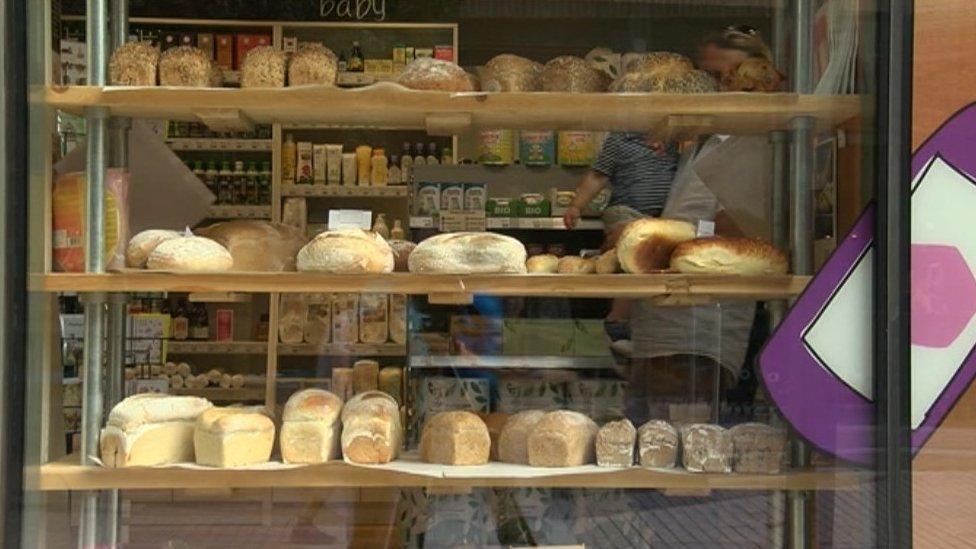
Freshly baked bread is another of the local products on offer
It is impressive and unusual. But behind the organic carrots on sale on this new harbourside avenue, there is a unique financial architecture.
Left to the normal rules of property investment and commercial banking, Bristolians would almost certainly be drinking coffee from the same chain cafes you would find in Birmingham or Bradford.